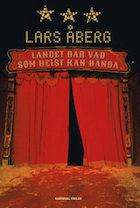Radio, television & foreign media:
I have been interviewed about ”Landet där vad som helst kan hända” on national public radio in Sweden, Denmark, Norway and Poland, and in French, Norwegian and Danish newspapers.
Cecilia Blomberg, Svenska Dagbladet:
”Åberg has dived deep into the archives and found that one of the explanations for today’s segregation is influential currents of ideas within the educational system and the cultural life, as well as political decisions made several decades ago. He has dug up and read government bills, which rather than encouraging the integration of new Swedes institutionalized ideas about ‘us and them’ and urged on separatism and a sense of exclusion…
Nothing will solve itself, the road ahead is long and winding. The first step needed is taken through open debate and by seeing reality just as it is. Åberg helps us quite a distance in that direction.”
Sakine Madon, Vestmanlands Läns Tidning:
“Piercing criticism of the defects of Swedish integration policies… Lars Åberg, what a journalist, what a writer!…
How did we end up here? Journalist Lars Åberg offers an important background in his book…
Åberg has a faculty for treading where it hurts and although there is no lack of opinion in ‘Landet där vad som helst kan hända’, it is also filled with plain facts. If we want to perform better and differently, we need to learn the lessons of previous shortcomings, not repeat them.”
Jens Stilhoff Sörensen, Respons Magazine:
”When I read Lars Åberg’s new book ’Landet där vad som helst kan hända’ two other books are conjured up in my mind. One is Evelyn Waugh’s novel “Brideshead Revisited”, the other is George Orwell’s “The Road to Wigan Pier”… In Åberg’s book there is both an undertone of something being lost, in the Swedish welfare project as well as in public debate and democracy, and an investigative journey into the events to come…
Åberg’s investigation is revolving round the issues of how things could have become the way are, how Swedish politics could change from rational, conscious planning to aimless irresponsibility, how journalists could move from critical coverage of the machinery of power to support for the very same forces, how conformity is blocking us up, and also the question of tackling these problems and if that is even possible. In this way, it is principally an inquiring book. It does not make it any less readable. On the contrary, it may well be a micro-distillate from and of a country in search of itself.”
Widar Andersson, Folkbladet:
“The book is full of questions – literally speaking – where the reader does not get away without thinking seriously beyond the simple answers and the safe terrain of empty rhetotic.”
Ingunn Økland, Aftenposten, Norway:
“A thought-provoking analysis of Swedish immigration politics… The desire to create a bigger picture makes it useful reading for us who have followed the Swedish debate from a distance…
Lars Åberg is at his sharpest – and most relevant – when he frames cogent admissions that self-critically also touch on his own work: ‘Since we so seldomly encounter any creative and constructive ideas about how we would like our society to function, we seem to be content with defensive or repressive assertions about how we do not want to see it.’”
Jens Ganman, author:
“Sweden’s sharpest contemporary observer.”
Thomas Nydahl, author:
“To read Lars Åberg is always to become wiser. His new book is perhaps the most important account of the changes taking place in Sweden. The things he describes and discusses will leave no one unmoved.”
Trygve Bång, author:
“I imagine that it is a strong affection for the country and uneasiness about its future that has made him write this enlightening book. It is an unparalleled, multi-dimensional progress report on the changing face of migration.”
Mats Edman, former editor-in-chief, Dagens Samhälle:
“Thought-provoking report from a country transformed by social engineering and ingenuous ‘structural benevolence’, written with brilliant journalistic diction and deep research through the years. Lars Åberg is an invaluable depicter of the rise of the Social Democratic project and – here and now – its fall.”

